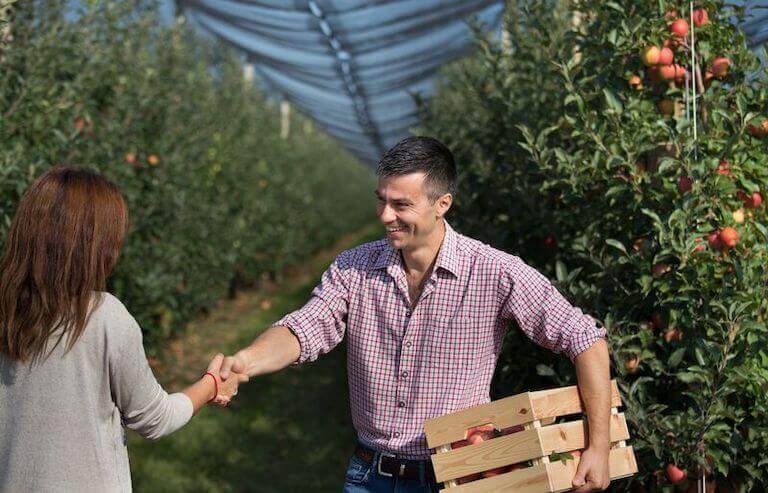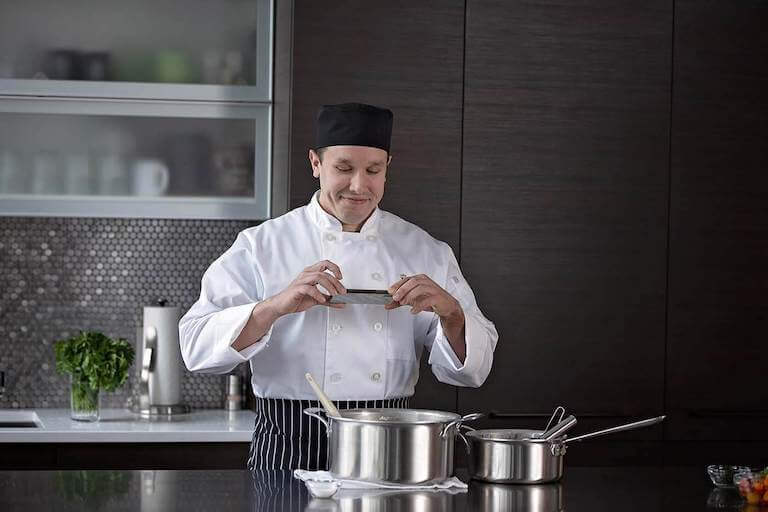Listen to This Article:
Picture yourself plating wild mushroom risotto in an open kitchen, transforming local harvests into fine-dining fare. You’re not alone.
According to a 2024 survey, 36% of Canadians aged 18 to 54 have dreamed of opening a restaurant, with younger Canadians gravitating toward cafés and older generations envisioning cozy family-style spots.
Canada’s food scene is bursting with possibility, from Vancouver’s innovative farm-to-table movement to Halifax’s celebrated seafood culture. But for many aspiring chefs, especially those in rural communities or smaller cities, access to formal culinary training can feel just out of reach.
But flexible online culinary programs can deliver top-notch skills based education to Canadians right in their own homes.
Breaking Down Geographic Barriers
For many Canadians, the nearest culinary school isn’t just a bus ride away—it could be in another province entirely. Traditional culinary education often requires relocating to major centers like Toronto, Vancouver, or Montreal, which isn’t feasible for everyone.
Online culinary programs are changing this landscape. Auguste Escoffier School of Culinary offers online programs in specializations like Culinary Arts, Baking and Pastry, Hospitality & Restaurant Operations Management and more. This can allow students to build professional skills right from their own kitchens.
These programs offer structured lessons, professional Chef Instructor feedback, and comprehensive training that matches traditional classroom education—all without putting your life on hold or leaving your community behind.
The timing couldn’t be better for this approach, as Canada’s culinary job market is booming. In early 2025 alone, Canada’s foodservice sector added 34,600 new jobs; Canada’s foodservice industry now supports nearly 1.2 million workers, representing about 6% of the national workforce.
No International Travel Required
Because programs are fully online with a hands-on industry externship and can be completed from within Canada, there’s no need for student visas or international travel. For detailed information about specific requirements and documentation needed, explore the international student application process.
Real-World Experience in Your Own Backyard
One of the biggest advantages of staying in Canada for culinary training is the opportunity to gain hands-on experience without leaving the country. Online learning doesn’t mean learning in isolation—every student completes a hands-on industry externship, whether locally or by pursuing an externship outside of their residential area that better fits their goals.
Picture this: completing your externship at a farm-to-table café in The Maritimes, working in a resort kitchen in the Rockies, or training at a bustling bistro in Québec City. These placements can allow students to build relationships with local chefs, explore regional food cultures, and gain résumé-ready experience.

Students build local connections through real-world externships.
“When you’re cooking in your home, you learn to improvise and work with what you have on hand, which is exactly what we do in professional kitchens,” says Kathleen Ahearn, Vice President of Academic Affairs at Escoffier. “You never know when something will break or a food delivery won’t show up on time, so you have to figure it out to make things work.”
This real-world preparation is invaluable for Canadian students who plan to work in Canada’s diverse culinary landscape, where adaptability and resourcefulness are essential skills.
Challenges to Consider
While online culinary education can offer significant advantages, it’s not without challenges. Some students might miss the immediate camaraderie of traditional classrooms, and online students need to be self-motivated. Some hands-on techniques can be harder to develop without in-person demonstration, and building industry networks can require more intentional effort.
Therefore it’s important to consider a program that leverages online instruction with real-world experience in a kitchen through industry externships.
Flexible Studies for Canadian Lifestyles
Whether they’re parenting full-time, working shifts, or managing a packed schedule, many students have multiple things to focus on at once. Online programs offer 24/7 access to lessons, allowing students to study during early morning hours, burn the midnight oil, or whenever works for them, within the confines of each academic week.
The flexibility particularly appeals to Canadian students balancing multiple responsibilities.
“The online program worked best for me because I could do my full-time job and be a full-time student. It was easy because it was flexible. I took off, spread my wings, and never looked back,” says Cassie Wallace, an Online Baking & Pastry graduate.*
*Information may not reflect every student’s experience. Results and outcomes may be based on several factors, such as geographical region or previous experience.
This approach also eliminates the daily commute that can be particularly challenging in Canadian winters or for those living in areas with limited public transportation.
Building Skills for Canada’s Evolving Food Scene
Canada’s culinary landscape is experiencing unprecedented growth and innovation. From Toronto’s multicultural dining scene to Calgary’s craft brewery boom, from Vancouver’s sustainable seafood movement to Montreal’s patisserie renaissance, opportunities exist from coast to coast.
Online culinary education can allow students to develop skills while staying connected to their local food communities. Whether your goal is opening a café in Charlottetown, managing a ski resort restaurant in Whistler, or launching a catering business in Winnipeg, you can build relevant skills while maintaining your community connections.
The ripple effect of foodservice growth extends beyond restaurants themselves. The industry helps create more than 287,000 spinoff jobs across Canada in fields like agriculture, wholesale, retail, and food entrepreneurship—creating opportunities for graduates throughout the supply chain.

Capture your growth one dish at a time, all while getting expert feedback from Chef Instructors.
Cost Considerations for Canadian Students
Traditional culinary school often comes with significant additional costs beyond tuition: urban housing, campus fees, and relocation expenses that can quickly add up, especially when moving to expensive cities like Toronto or Vancouver.
Online programs can eliminate many of these extra costs while maintaining educational quality. Students receive professional instruction, cooking demonstrations, and personalized feedback, along with access to a comprehensive culinary curriculum. Professional-grade toolkits and chef uniforms are shipped directly to students’ doors, to help support students with the essentials they may need from day one.
For many Canadians, this represents a more affordable path to gaining high-quality culinary skills while building a career with confidence in their home communities.
Credentials That Can Open Doors Across Canada
Whether you dream of working at a cozy bistro in your hometown or eventually taking your skills to major culinary centers like Montreal or Vancouver, your education should provide options. Quality online culinary programs offer credentials that may be respected across Canada and internationally.
The beauty of earning your culinary credentials while staying in Canada is that you can graduate with both professional training and a deep knowledge of your local food scene—a combination that’s increasingly valuable as Canadian restaurants emphasize local sourcing and regional specialties.
“I graduated from the online Pastry Arts program. I never thought I would enjoy going back to school at age 63, but I did!” says Janet Herring, demonstrating that culinary education can be transformative at any stage.*

Hone your skills right from your home kitchen.
Support Tailored for Canadian Students
Navigating international education can seem complicated, but Escoffier offers personalized support to all students,offering personalized support throughout the enrollment and educational process.
The application process for Canadian students requires just three steps to enroll compared to the eight required for in-person programs:
1. Apply for Admissions
The basic application process is the same for Canadian students as U.S. students. Once you’ve selected your program, you can complete your culinary school application in just a few minutes.
2. Provide Proof of High School Graduation or Equivalent
All students must show proof of high school graduation or an approved equivalent. Canadian students should have their graduation document evaluated for U.S. equivalency by a translation company approved by the National Association of Credential Evaluation Services.
3. Provide Proof of English Proficiency
Because courses are taught in English, students must demonstrate proficiency through various accepted methods, including TOEFL, IELTS, Cambridge English tests, or graduation from an English-speaking institution. For those who need more time to gather documentation, conditional acceptance may be available.
The Future of Canadian Culinary Education
The landscape of culinary education is shifting across Canada. For students in Thunder Bay, Charlottetown, or anywhere between, geographic barriers to quality training are becoming less relevant. The question isn’t whether online culinary education can work for Canadians. Instead, the question is whether it fits your learning style, career goals, and life circumstances.
Whether you’re looking to break into the foodservice industry or develop skills for a culinary entrepreneurship venture, you don’t need to wait for the “right time” or relocate to the “right place.” Online culinary education allows you to begin your journey wherever you are in Canada and take your career wherever your passion leads you. Contact us today for more information, or apply now.

